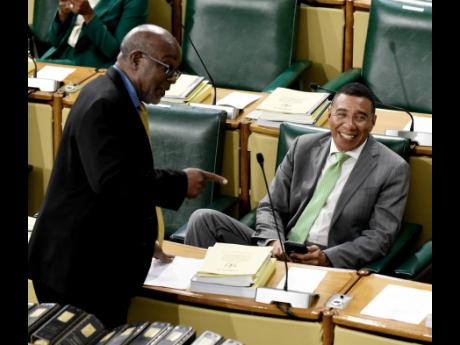Editorial | Fitz Jackson’s persistence
It took ages. So Fitz Jackson, the opposition member of parliament, is allowed to enjoy a sense of relief and vindication over the central bank’s announcement of service standards to which Jamaica’s financial institutions must adhere with respect to their automated banking machines (ABMs).
Hopefully, though, Mr Jackson, long a lonely voice on the matter, will not consider last week’s development an end to his advocacy. The deposit-taking institutions (DTI) have nine months to transition to the new regime, which is a long time for things to slip.
Mr Jackson will therefore do consumers a service if he continues his vigil to ensure that neither of the parties, the regulator or the banks, renege on the undertakings.
At the same time, until the creation of the specialist and robust consumer protection watchdog for the financial sector, it would be useful if Mr Jackson lends his voice to questions of whether the specifics of the BOJ’s regime are in line with international best practices. In other words, it will be good if he remains, for now at least, a watchdog of the watchdog.
Mr Jackson has long claimed that Jamaica’s banks charge too much for the services they provide (he currently has Bank of Nova Scotia in court over a claim that the bank’s J$385, or 15.4 per cent, charge/fee for changing a J$2,500 cheque in 2019 was illegal). For over a decade he has aggressively campaigned for reforms.
TABLED BILL
In 2014, as a backbencher, when the People’s National Party (PNP) was in office, Mr Jackson tabled a private member’s bill to legislate minimum service standards.
The PNP left office before the bill reached Parliament’s order paper. Mr Jackson brought the bill back under the new government, which voted it down in February 2018.
At the time, the then finance minister, Audley Shaw, claimed that several of the bill’s provisions were already in the Bank of Jamaica’s (BOJ) code of conduct for DTIs. In the event, he promised that the regulator would, in short order, advance and elongate the provisions.
It was six years until the BOJ released its standards regime for ABM last week. These will, among other things, require that at least 90 per cent of the ABMs in the system are operational, with a minimum 95 per cent uptime. ABMs in urban centres should be out of cash for no more than an hour, and for a maximum of three hours in other areas.
Banks will be required to tell their customers, in real time, when their machines are out of service, as well as “transparently and comprehensively disclose ABM fees and charges to customers”.
The central bank also said it would “commission assessments of ABM-related fees to determine their reasonableness and relevance”.
However, compliance will be an honour system via the “BOJ’s review and publication of monthly reports from the DTIs”.
Added the regulator: “No monetary sanctions will be applied as a result of breaches of the guidelines; however, non-adherence may give rise to supervisory concerns around safety and soundness with the attendant supervisory consequences.”
NOT CLEAR
It is not clear which stakeholders, other than the DTIs, were party to the formulation of these guidelines, which the BOJ said will be anchored in law when the new regulatory arrangements come into place, giving the central bank regulatory oversight of the entire financial sector. Another body will be responsible for the consumer protection/ education side of the business.
The finance minister, Nigel Clarke, has said that legislation for this “twin peak” system should be passed in 2025.
Currently, while the BOJ regulates banks, investment houses and brokerages are overseen by the Financial Services Commission, which suffered a major loss of confidence last year over scandal at Stocks and Security Limited that revealed a litany of regulator failures.
In the circumstances, the central bank’s bosses will understand if there were calls that these proposals should not yet be written in stone, allowing a window for a wider review.
For instance, in Britain, where 85 per cent of payment transactions are done digitally; 95 per cent of the population lives within three miles of an ABM; and no one in an urban area is more than a mile from one, yet the Treasury has stipulated that there should be no charge for cash withdrawals from individual current accounts.
This “reasonable provision of cash access service”, the Treasury has argued, was to prevent, “in the absence of government intervention”, a disorderly decline in cash, which would be “detrimental to users”.
Further, are these the sum of the service standards that will be required by the overseers?

